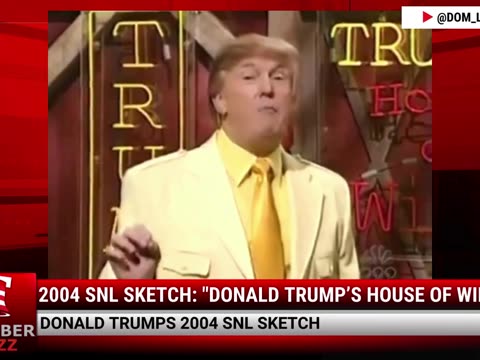Economists warn such a policy, known as a border carbon adjustment, would be unworkable unless the United States imposed a carbon tax or a similar pricing scheme on its own domestic goods.
Currently, Biden is not planning a carbon tax as part of his new goal to cut U.S. emissions in half by 2030 and has instead proposed for Congress to pass a clean electricity standard mandating utilities use more zero-carbon electricity.
At an event on Thursday hosted by the Niskanen Center, moderator Joseph Majkut, the group’s director of climate policy, deemed the infeasibility of the U.S. proceeding on a border adjustment without a domestic carbon tax as “the elephant in the room” threatening the Biden administration’s climate agenda.
WATCH: 2004 SNL SKETCH: "DONALD TRUMP’S HOUSE OF WINGS”![]()
“If the U.S. didn't have a national carbon price, it just doesn't make sense to have a border carbon adjustment,” Shuting Pomerleau, a Niskanen climate policy analyst, told the Washington Examiner in a subsequent interview. “You are not putting a price on carbon emissions domestically, so how do you justify a tax on imported goods?”
WATCH: ESPN HOST- DEMOCRAT STRATEGY IS NOT WORKING![]()
Noah Kaufman, a senior economist in the White House Council of Economic Advisers, previously told the Washington Examiner before joining the administration that the U.S. could not tax other countries' carbon-intensive products if it didn’t first penalize its own.
WELP, CLIMATE WARRIORS HAVE THEIR NEXT TARGET PICKED OUT...![]()
“In a world without a carbon tax, we would basically be saying we are applying this somewhat arbitrary tax to your goods even though we’re not applying it to our goods,” said Kaufman, who was then an economist at Columbia University’s Center on Global Energy Policy. “I can't see other countries taking that well.”
For carbon tax proponents, imposing a matching border carbon adjustment has long been viewed as essential to avoid harming the competitiveness of U.S. industries. If exporters of carbon-intensive goods such as steel, aluminum, cement, glass, and some agricultural products have to pay a fee equivalent to the U.S. carbon tax, it would remove the incentive for American companies to move overseas to avoid paying the domestic fee.
TRUMP POINTS (MIDDLE) FINGER AT BIDEN AS PRO-HAMAS DEMONSTRATIONS DESTROY THE IVY'S![]()
TAXPAYER DOLLARS AT WORK: OUTRAGE OVER UC BERKELEY'S TAYLOR SWIFT MARKETING CLASS![]()
Economists, however, point out two primary problems with imposing a border carbon adjustment without a domestic tax on carbon emissions.
The first is an accounting question. If the U.S. set a carbon tax starting at $50 per ton, for example, the U.S. could simply tax imported goods equivalently. There is a range of ways to decide which products to tax and how to determine their carbon intensity, but those that qualify would be subject to the $50-per-ton tax.
TENSIONS BOIL OVER AS PRO-PALESTINE PROTESTERS ARE ARRESTED OUTSIDE TOP DEM LEADER'S HOME![]()
But without such a point of comparison, it would be difficult to come up with a fair rate to tax imports.
The second problem is fairness. Other countries would be less likely to cooperate if the U.S. also doesn’t tax its own emissions.
If the U.S. can’t pass a carbon tax, it risks being left behind by allies and competitors.









 Discover alternative ideas that will make you think
Discover alternative ideas that will make you think Engage in mind bending debate
Engage in mind bending debate Earn points, rise in rank, have fun
Earn points, rise in rank, have fun


